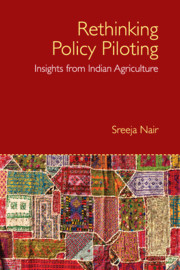Book contents
- Frontmatter
- Contents
- List of Figures and Tables
- Acknowledgements
- List of Abbreviations
- 1 Rethinking Policy Pilots in the 21st Century
- 2 The Context of Indian Agriculture for Piloting
- 3 A Landscape of Agriculture Policy Pilots
- 4 A Qualitative Comparative Analysis of Policy Pilots
- 5 From Piloting to Policy: Lessons and the Path Ahead
- Appendix A
- Appendix B
- Index
4 - A Qualitative Comparative Analysis of Policy Pilots
Published online by Cambridge University Press: 06 August 2021
- Frontmatter
- Contents
- List of Figures and Tables
- Acknowledgements
- List of Abbreviations
- 1 Rethinking Policy Pilots in the 21st Century
- 2 The Context of Indian Agriculture for Piloting
- 3 A Landscape of Agriculture Policy Pilots
- 4 A Qualitative Comparative Analysis of Policy Pilots
- 5 From Piloting to Policy: Lessons and the Path Ahead
- Appendix A
- Appendix B
- Index
Summary
Introduction to the Set-theoretic Approach
Findings from studies on pilots and their diffusion are often found to be accompanied with a note of caution in terms of limitations in their generalizability beyond the context in which the pilot was implemented. While this is expected, there is value in comparative analysis of pilots, just as for full policies to move the literature on policy piloting and their design forward. Indeed, as the discussion in Chapter 3 reveals, the 13 pilots studied in this book cover a wide variety of risk management categories, varying in terms of the time the pilots took to diffuse and the forms in which these ultimately integrate (or not) into ongoing policies. Notwithstanding these context-specific variations, in this chapter these pilots are compared across specific design features (discussed in Chapter 1) to see if they associate with observed low or high diffusion as an outcome.
A set-theoretic approach is chosen to do this comparison in answering the research question, ‘How do design features of pilots influence their diffusion?’ Sets are concepts that are defined by boundaries of inclusion and exclusion (Mahoney 2010). Inclusion in a set (or not) is determined by assigning set memberships (a process of calibration or standardization) based on theoretical and empirical evidence (Ragin 2000). Set-theoretic methods can be deployed for a study if the phenomenon or concept of interest is best studied in terms of set relations (Schneider and Wagemann 2012). When cases are studied using Qualitative Comparative Analysis (QCA), the outcome and causal conditions are not studied as variables in the conventional sense but rather as degrees of membership in a set (Kent and Olsen 2008). One of the most formalized technique for set-theoretic research (Schneider and Rohlfing 2013) is QCA.
QCA helps in bringing to fore challenges in conceptualizing social and political phenomena. By aiding in the identification of patterns within a comparable dataset, QCA brings a level of abstraction to the study of concepts and phenomenon that are otherwise dependent on highly context-driven single-case analysis studies (Legewie 2013). In it, cases are represented by configurations of their membership in causal conditions and outcome of interest, with the objective of deriving a minimum explanation or simplest combination of factors leading to a particular outcome from the many possible ones (Cress and Snow 2000; Rihoux and Ragin 2008).
- Type
- Chapter
- Information
- Rethinking Policy PilotingInsights from Indian Agriculture, pp. 110 - 133Publisher: Cambridge University PressPrint publication year: 2021



